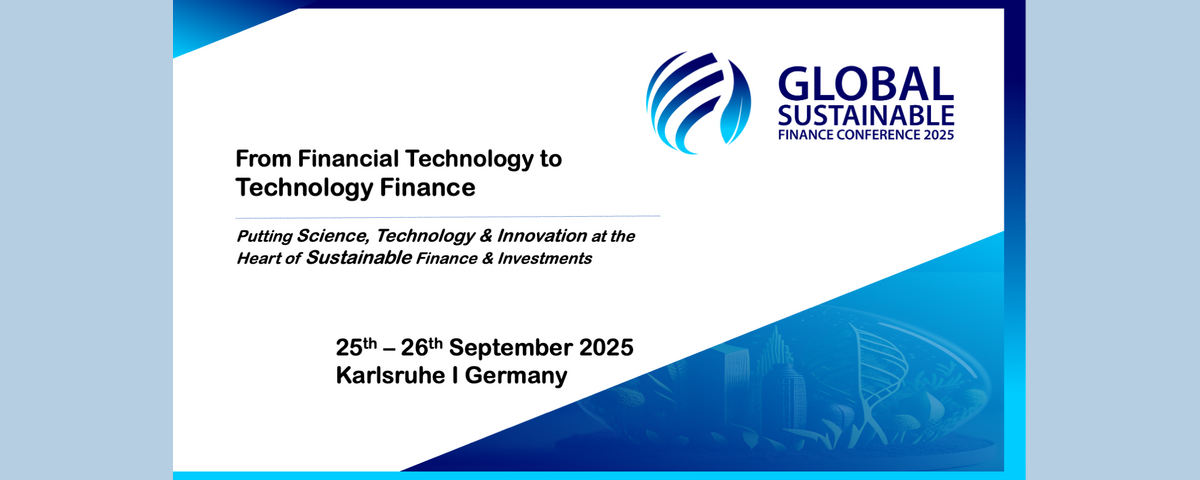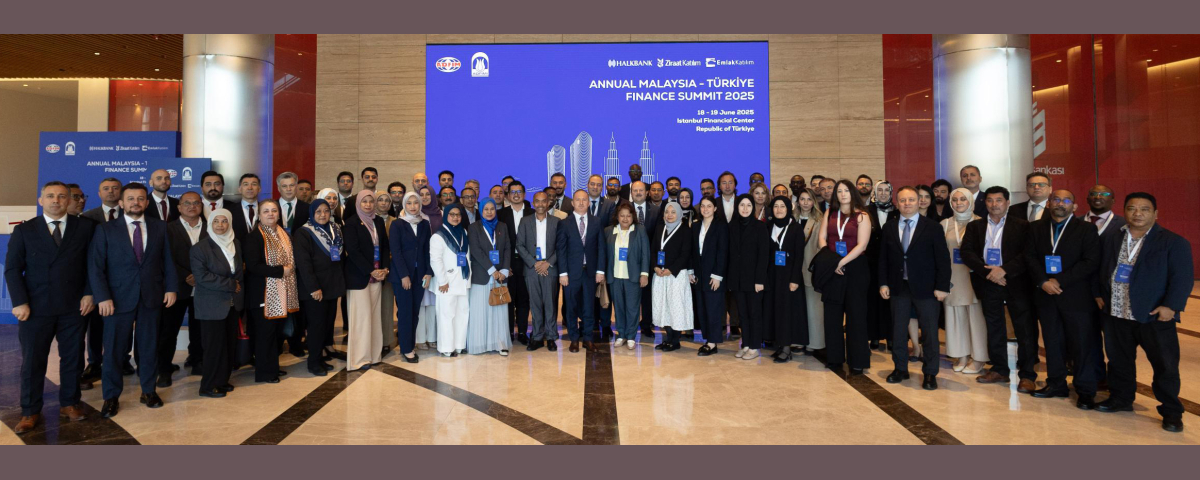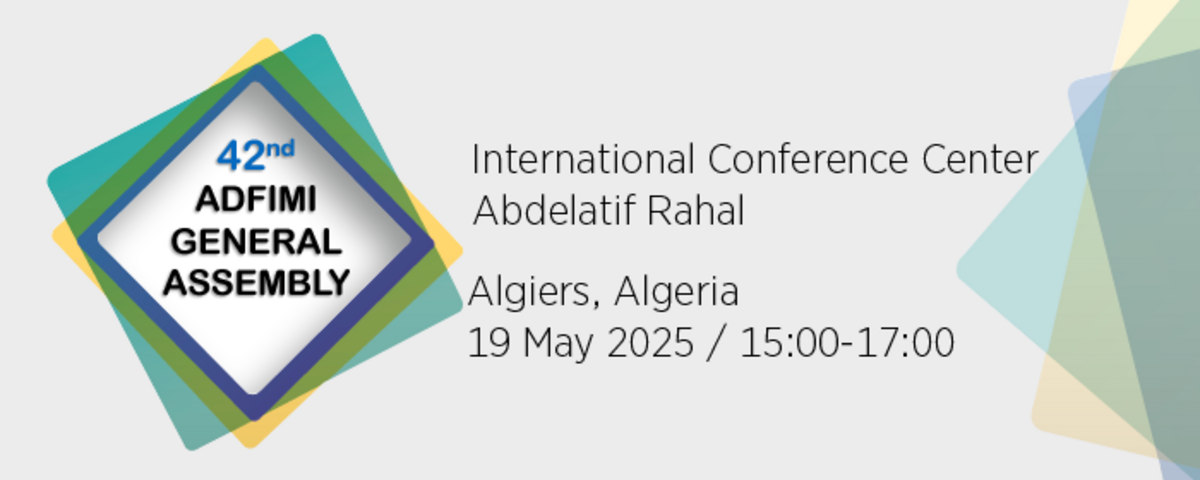ADFIMI – Jordan Islamic Bank Joint Regional Seminar on “SME FINANCE & DEVELOPMENT”, Amman, Jordan, 30-31 October 2018
POST SEMINAR REPORT
of ADFIMI – Jordan Islamic Bank Joint Regional Seminar on
“SME FINANCE & DEVELOPMENT”
The event took place as planned and according to the schedule given in the flyer.
Registration
The registration started at 08:30am and closed at 09:00am.
Start of the Seminar
At 09:30am Mr. Mohammed Imam, Assistant General Manager Jordan Islamic Bank (JIB) formally started the seminar as the Master of Ceremony (MC). He thanked the Governor of the Central Bank of Jordan, H.E Dr. Ziad Fariz for his patronage of the seminar and welcomed H.E Dr. Maher Hasan, Deputy Governor of the Central Bank of Jordan for attending on behalf of H.E Dr. Ziad Fariz. He also welcomed Mr. Musa A. Shihadeh, CEO and General Manager of the Jordan Islamic Bank, Mr. Metin Özdemir Chairman ADFIMI and Mr. Abdelilah Belatik, General Secretary CIBAFI as well as the speakers and guests. He invited Mr. Musa Shihadeh to the stage for opening remarks on behalf of Jordan Islamic Bank.
Opening Remarks
Mr. Musa Shihadeh started his opening remarks by welcoming and thanking the distinguished guests and wished the foreign delegates and speakers a pleasant stay in Jordan. He also thanked ADFIMI for choosing Jordan for this prestigious seminar; the Governor of the Central Bank of Jordan for his patronage of the seminar; and H.E Dr. Maher Hasan, the Deputy Governor of the Central Bank of Jordan for his graceful presence.
He then highlighted the importance of SMEs and development in achieving security, social stability and sustainable development in the region. He discussed the current situation of SMEs in the MENA region and their importance in uplifting the region and also highlighted the challenges they faced in achieving their goals. Mr. Shihadeh mentioned the role of the JIB in financing SMEs in Jordan for the last 39 years and said that JIB considers it to be its top priority.
Mr. Metin Özdemir started his opening remarks by thanking H.E Dr. Ziad Fariz, Governor of the Central Bank of Jordan for his patronage, Mr Abdelillah Belatik, Secretary General, CIBAFI, Mr. Bilal Rabah Al Sugheyer, Resident Mission in the Hashemite Kingdom of Jordan, International Finance Corporation (IFC), World Bank Group, Mr. Musa Shihadeh, CEO and General Manager of the Jordan Islamic Bank, as well as other participants and welcomed them in his capacity as the Chairman of ADFIMI.
The Chairman expressed his special gratitude to Mr. Musa Shihadeh, CEO and General Manager of the JIB for jointly organising this seminar, with ADFIMI. He then gave a brief introduction of ADFIMI in order to enlighten those who were not familiar with the association.
Mr. Özdemir went on to explaining how the SME Development had always been among the top priority issues of ADFIMI. He mentioned that, in this September, ADFIMI had organized an International Forum on SME Development and Digitalisation in Istanbul where, Mr. Shihadeh has been among the most prominent contributors.
The Chairman also highlighted the importance and role of SMEs in development and also explaineds their contribution to the GDP. He said that the issues relating to SME Finance and Development were so crucial and vital that ADFIMI would always continue to deal with this issue by updating its members and other development finance institutions on the most recent developments. 2
Inauguration Addresses
Deputy Governor of the Central Bank of Jordan H.E. Dr. Maher Hasan delivered his inauguration speech. He started by expressing his pleasure for being part of the seminar and for talking about the SME Finance and Development, a subject which was close to his heart.
He highlighted the condition of SMEs in the region and particularly in Jordan and mentioned that the condition of SMEs were much better in Jordan as compared to its neighbours, but lacked far behind when compared to the rest of the developing world.
He also explained the role of the Central Bank of Jordan in financial stability, financial inclusion and consumer protection as well as the importance of inclusive growth and the importance of ease of doing business to encourage the SMEs.
He said that, the SMEs usually preferred Sharia compliance as it gave ease in acquiring finance for their businesses. The strategy adopted by the Central Bank of Jordan in 2012, refocused or changed and restructured the Jordan Loan Guarantee Company. In 2011, the company used to guarantee 500 loans per year and most of them were real-estate loans; whereas in 2017, they guaranteed more than 1800 loans and many of them to the small enterprises.
The central bank of Jordan also helped the Islamic banks in Jordan, in a programme called KAFALA, which was a Sharia compliant loan guarantee programme. Since then, the share of the Islamic banks in total loans increased closed to 50%, despite the fact that their market share was only about 20%, which confirmed that the SMEs preferred Sharia compliant loans in the Jordanian market.
Partnerships of the Central Bank of Jordan with other international organizations was also important in the development of SME finance and development.
At the end, he highlighted the importance of the change in the mind-set of the people at the top of the financial institutions to consider SMEs in a friendly way, which may change the lives of the under-served part of the societies around the world. In this instance, the Islamic banking and Sharia compliance financing could play a vital role in the development of SMEs.
H.E Dr. Maher Hasan was then presented a token of appreciation by Mr. Özdemir, on behalf of ADFIMI.
Inauguration Speech
Mr. Abdelilah Belatik started his inauguration speech by thanking the organizers, JIB and ADFIMI, and also the distinguished guests and participants.
He highlighted the global level feedback, which they get from Islamic banks around the world. He agreed with Dr. Maher Hasan on the importance of SMEs on global level, with their contribution to GDP.
Mr. Belatik also talked about the initiatives taken in the MENA region with regards to SMEs. He said, despite the initiatives, there was still a lack of financing of SMEs in Islamic countries. He also mentioned the factors affecting the SMEs finance, such as religious beliefs, lack of awareness and education. He also shared some of the recommendations to overcome the challenges of SME financing, including the Islamic banks’ capacities, where many of the Islamic banks did not even have specific departments dealing with SME financing. He also highlighted the importance of regulatory reforms, in sharing responsibilities between regulators and banks. 3
At the end he talked about the work CIBAFI was doing. CIBAFI was the global representative of Islamic banks, with over 130 banks from 34 countries.
At the end of his speech Mr. Belatik was presented a token of appreciation on behalf of ADFIMI by Mr. Özdemir.
Photo Session
There was a photo session where all the guests and participants, participated in the photo session and a group photo was taken.
Keynote Address
The seminar went on with the keynote address of Mr. Bilal Rabah Al-Sugheyer, Resident Mission in the Hashemite Kingdom of Jordan, International Finance Corporation (IFC), and World Bank Group. Who started his keynote address by thanking the organizers particularly ADFIMI for inviting him to the seminar as a keynote speaker and also the JIB. The theme of the address was “Two hundred billion and counting” State of Small & Medium Enterprises Development in MENA.
He began by explaining the growth and finance of SMEs and said that supporting SMEs was not a luxury but we could afford it for growth. The informal economy and the SME sector together generated about 65–70% of GDP across all country income levels and accounted for 25%-63% of total employment. And urged that preventing SMEs from reaching their full potential, would be detrimental to addressing pressing economic challenges.
Mr. Bilal explained that access to finance was a major driver of growth and in access to finance was often cited as one of the primary obstacles that affected SMEs disproportionately. SMEs access to finance remained a challenge in the MENA and average share of SME lending in MENA was low, even less than 8% of total lending, as Banks and NDFIs primarily targeted large commercial enterprises. Mr. Bilal quoted World Bank enterprise and bank surveys that MENA had the lowest levels of usage of bank loans of all regions except sub-Saharan Africa.
The SMEs access to finance was still a challenge due to factors like the business environment and SME internal factors. The business environment factors included the legal and regulatory framework, access to external financing and human resource capacities. And the SME internal factors included entrepreneur characteristics, management capacities, marketing skills and technological capacities.
He also explained the need for understanding what “SMEs” really were and what they wanted. He mentioned that 90% of their experts expected the share of SME Financing in their markets to increase over the next years, to more than 20%.
Mr. Bilal Rabah Al-Sugheyer was presented a token of appreciation on behalf of ADFIMI by Mr. Metin Özdemir
Session 2
In the second session, there were four speakers. The first was Dr. Mohammed Al-Ja’fari who gave a presentation on the status of legislative and facilitative aspects of SME Development.
Dr. Mohammed said that talking about SMEs in general was very challenging and interesting and shared his experiences in understanding the SMEs and the factors affecting its financing, particularly in the MENA region. He also explained why proper economic policy interventions were needed and to make sure that the SMEs obtained their fair share of financing. 4
There was a difference between SME lending and financing in general. It was important to understand both sides of the equation: the demand side and the supply side. Without proper reading the demand side of the equation, one would not be able to design the right products and right delivery model to address the deficiencies that are in the demand side of the equation. He also talked about the specific needs of SMEs.
From his experience, majority of the SMEs were not sophisticated enough to provide a loanable case to the bank, so he urged the need to work with them and to educate them in order to improve their capacity, upgrade their skills and capabilities. In this regard the responsibility not only lied with the banks, but it should be started with the education system and other supporting organizations.
Jordan Loan Guarantee Corporation (JLGC) in collaboration with Central Bank of Jordan, tried to analyse the financing needs of different segments of SMEs and develop different programmes and policy intervention rules to make sure that they promoted the supply side. The chances for that would always depend on the chances of the improvement of the demand side. He mentioned some of the programmes, such as the KAFALA programme, which was the loan guarantee product consistent with Islamic financing programmes and also other programmes which provided financing to SMEs. There was a need to keep a careful eye on these programmes as to now these programmes were perceived, and to what extent they really achieved the targeted objectives.
The next speaker was Dr. Maher Al-Mahrouq who spoke on SME lending; Education and training aspects, who began his presentation by thanking the organisers. He said the topic of ‘SME finance and Development’ was one of the most important and interesting topics everybody was talking about these days. It showed the importance of SMEs not only in the financial sector but also in terms of enhancing the level of development, job creation and poverty alleviation, particularly in developing countries like Jordan.
He also talked about the challenges SMEs were facing in obtaining financing, SMEs’ role in the future. There was need to educate to understand the SME development and without education it would not be easy to achieve the goals and targets. He underlined the importance of the conceptual framework and with this it would be easy to develop the environment, the tools, the processes and procedures to enhance the role of SMEs.
He concluded his speech by explaining the role of Jordan Chamber of Industry in terms of enhancing and helping SMEs. There were around 18000 members of Jordan Chamber of Industry and the membership was obligatory for all industries and manufacturers. He also explained the conditions for the members in casting their vote while choosing their representative. Due to certain laws of the Chamber related to their assets size and number of registered workers, only a small portion of the members were able to vote.
The next speaker was Mr. Adi Ghuneim, who started his presentation by mentioning that, majority of the topics were already covered by the previous speakers, about SME finance and Development. He highlighted and tried to answer some of the questions raised by the previous speakers.
He talked about how the Jordan Enterprise Development Corporation (JEDCO) saw the challenges particularly on the demand side and supply side and mentioned that JEDCO’s focus was always on the demand side. JEDCO was an institution which was designed to help the SMEs, and provide technical and financial support to the SMEs. He mentioned that their focus was mainly on enhancing exports. The export development board was a programme that was designed to enhance the exports of SMEs, by providing loans up to 2,000 Jordanian dinars and also help SMEs in their capacity building. JEDCO had another program called “Accelerator”, which provided technical assistance to SMEs.
The second part of JEDCO’s role was enhancing SME financing, and also played the role of a follow-up agency for the SMEs. The type of business JEDCO targeted were the manufacturing sector and 5
services sector. The major aim of JEDCO was to help the private sector in order to create employment and to enhance the socio-economic situation.
The next speaker was Dr. Qasem Hamouri, who started his speech by saying that he would talk more about academic point of view of SMEs Finance and development, instead of the practicing point of view.
He explained about the philosophy of Islamic finance and highlighted that Islamic financing depended on the factors of production, meaning that capital could not go to investors as independent factor, as it had to go with labour on the basis of partnership. As Islamic teachings were against the constant rate of return and favoured the variable rate of return, and usually Muslims avoided conventional system of banking because of Reba (interest). If the Islamic banks reduced their cost of financing, not only the Muslims but also the non-Muslims would turn to Islamic banking. It was not only the responsibility of Islamic banks to help SMEs but also the government and academia. As an academician, academic institutions would have to encourage graduates to start their own businesses or start-ups, instead of looking for jobs. In this regard, utilisation of Waqf and Zakat and Qard Hasan could play a major role in financing such SMEs.
He suggested that, the Islamic banks should in collaboration with academia, think of and find creative solutions to challenges facing SMEs.
At the end of session II, Mr. Metin Özdemir presented tokens of appreciation to all four speakers of the session on behalf of ADFIMI.
Day2: Session 3
Mr. Fatih Kazan, financial sector specialist,World Bank, Global Islamic Finance Development Centre, Istanbul Turkey, was the first speaker of the day. His subject was Islamic Fianance as a Catalyst for Access to Fianance.
He started his presentation by thanking the organizers and expressed his pleasure for being part of the seminar. His presentation included information on the state of MSMEs in selected Muslim countries, developments in Islamic finance and Fintech in Islamic finance for financing MSMEs.
Mr. Kazan explained the condition of MSMEs in selected Muslim countries which included Djibouti, Egypt, Indonesia, Jordan, Lebanon, Malaysia, Morocco, Pakistan, Sudan, Tunisia, Turkey and Yemen. In the developing countries there was 8.9 trillion USD potential demand for MSME finance, but the current was 3.7 trillion USD hence there was 5.2 trillion USD finance gap for formal MSMEs. The potential for finance demand from informal entrepreneurs was 2.9 trillion USD and the number of formal MSMEs with credit constraints were about 65 million. He pointed out that the alternative financing instruments for SMEs was the Islamic finance.
In the second part of the presentation he explained the developments in Islamic finance. Where he elaborated the facts on why the Islamic finance mattered. He uncovered the facts that financial systems had strong linkages with economic development and Islamic finance could play a vital role in developing the financial system of a country and could be a catalyst for financial inclusion in OIC countries. Islamic capital markets could diversify and deepen financial markets and could play a critical role in economic development, poverty alleviation, and enhancing prosperity. Islamic finance could enhance stability of financial and banking sector as observed by theoretical and empirical research. Islamic finance which was (risk-sharing) system, so, through stronger institutions, sound legal regimes, enhanced governance framework, and transparent flow of information was essential to developing a risk-sharing financial system. 6
In the third part of the presentation Mr. Kazan highlighted the importance of Fintech in Islamic Finance for financing MSMEs. While Islamic Fintech had a huge potential, OIC countries needed to invest more on IT infrastructure in order to pave the way for the development of Islamic Fintech. He also gave some Islamic Fintech examples such as Narwi, which was a non-profit online crowdfunding platform that allowed donors to support micro-entrepreneurs of their choice. While the majority of Islamic Fintech was crowdfunding platforms, there have been recent developments in other forms of Fintech, such as Islamic robo-advice. New initiatives were also flourishing such as Islamic robo-advisors, Investment Account Platform, Islamic Fintech Alliance and Islamic Fintech Hub.
The fourth and last session of the seminar began by the presentation of Prof. Dr. Ahmet Faruk Aysan, who talked on How Digitalisation affected SME Development Finance, and included the detailed information about SMEs, Digital economy, Opportunities for SMEs and Challenges for SMEs.
Even in a global economy where multinational giants continue to thrive, SMEs accounted for 90 percent of all businesses worldwide. They created four out of five new jobs in emerging markets, according to the World Trade Organization. The digital opportunity for SMEs could be sensed by the simple fact that online buying for both B2B ($7.7 trillion) and B2C ($2.3 trillion) goods and services were on a global growth trajectory. Yet, SME growth in global commerce had been facing trouble entering and competing in the cross-border marketplace, and their access to finance remained limited. Currently, only 38 percent of businesses around the world could process international orders and only 33 percent sold beyond their own borders, thus causing more than half of all SMEs to miss out on global business opportunities due to lack of access to infrastructure and regulatory expertise. SMEs were widely hindered by lack of access to credit, knowledge gaps, regulatory imbalances, and limited access to competitive technology. The credit gap to formal SMEs in the MENA region was estimated to be the highest globally.
According to the World Bank, 19 percent of SMEs considered access to financing to be a severe obstacle, and 20 percent avoided applying for loans due to complex application procedures. Digitalization had become an affordable platform that fostered social and financial inclusion and could enhance savings, with micro-savers encouraged to open bank accounts and banks to offer short-term loans.
Having a range of new technologies swarming into our everyday lives, we were in the midst of a digital transformation, with 40 percent of the world population now connected to networks, up from four percent in 1995. Digital financial services could boost the GDP of emerging economies by $3.7 trillion or 6 percent above baseline projected GDP. Nearly two-thirds of the additional GDP would likely come from improved productivity enabled by digital payments. Businesses, financial-service providers, and government organizations all reaped large efficiency gains in the shift from cash to digital payments and from paper to electronic record keeping. This resulted in less time spent performing manual processes and traveling to and from bank branches.
Digitalization helped SMEs to enter into financial network and the introduction of Fintech had revolutionized SME financing through offering unprecedented solutions to deal effectively with the main barriers that SMEs faced in financial markets: i.e. information asymmetries and collateral shortage.
The World Bank had determined a whole set of challenges that were preventing the digital revolution from fulfilling its transformative potential in developing countries, to which policy solutions were required, and among which were digital economy dis-benefits. These digital dis-benefits could be categorized into three factors that included Digital Exclusion, Digital Inequality and Adverse Incorporation and Digital Security and Privacy Breaches. 7
Mr. Reza Ismail was the last speaker who spoke on Blockchain in SME Finance. He started his presentation by giving the definition of the concept of blockchain. The concept was first published by a (fictional) person named Satoshi Nakamoto in 2009, in the form of a white paper about a peer-to-peer electronic cash system called Bitcoin.
He shared with the participants that Cryptocurrencies were very early stages of blockchain technology utilisation. He also explained the future of blockchain technology from the very simple to the complex. A blockchain network was decentralized and distributed. There were many copies of the blockchain and the blockchain data were stored in many locations around the world and they were continuously being replicated. The blockchain was append only which means that transactions were always added to the end of the block and once committed they could not be changed, edited or updated in any way. The transactions within the blockchain were encrypted and were transparent but anonymous. Transactions could be viewed (Read only) but it was encrypted to everyone except those that were participating in the transaction. The Blockchain did not require a central authority to perform, verify or approve transactions. It was not controlled or owned by a single entity and operated autonomously and used cryptography as a core protocol for creating transactions and verifying ownership of data.
Mr. Reza also explained how the blockchain could be utilised in SME finance. In his opinion Blockchain could be used to tokenize SME financing directly from the investor to the SME. Terms of mutual agreement and repayment could be created and enforced via a smart contract which could also be used to create disbursement rules based on goals and achievements. Tokens could be redeemed for cash direct through the bank or exchanged for products and services throughout an SME token ecosystem.
All three speakers were then presented tokens of appreciation on behalf of ADFIMI by Mr. Musa Shihadeh presenting to Mr. Fatih Kazan, Mr. Abdelilah Belatik presenting to Dr. Ahmet Faruk Aysan and Mr. Suat İnce presenting to Mr. Reza İsmail.
At the end, the Secretary General of ADFIMI, Mr. Nuri Birtek, presented a token of appreciation to Mr. Mohammed Imam, on behalf of ADFIMI for his contribution to the event.
Participants:
There were altogether 40 participants from six countries.
SEMINAR PHOTOS:


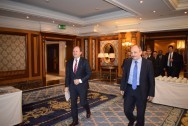
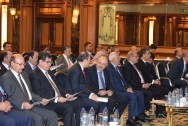
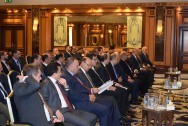
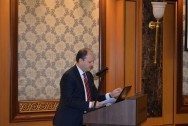
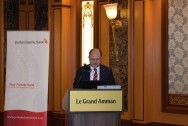
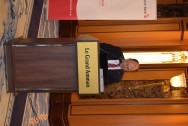
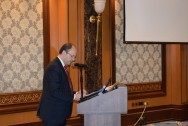
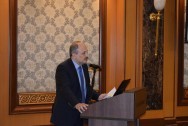
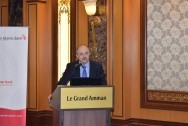
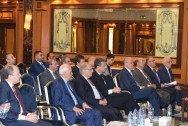
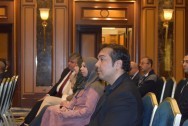
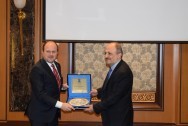
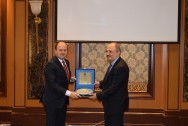
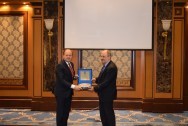
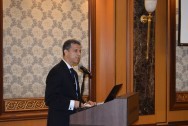
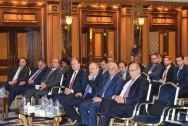
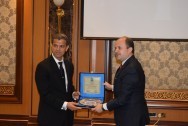
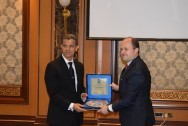
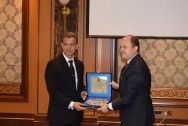
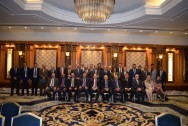
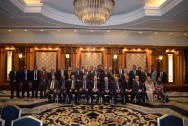
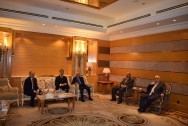
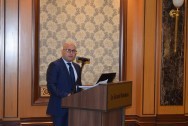
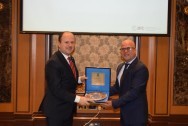
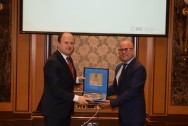
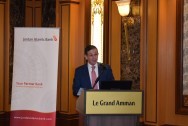
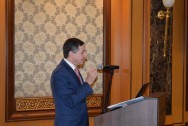
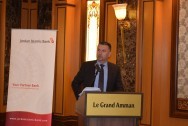
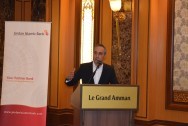
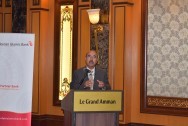
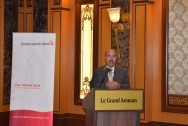
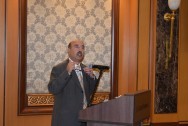
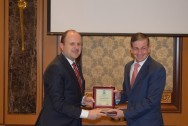
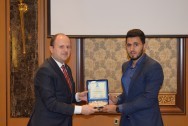
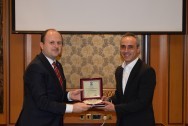
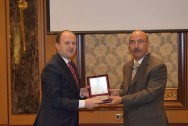
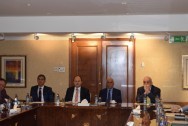
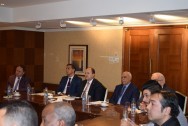
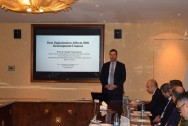
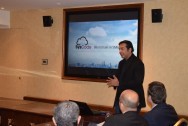
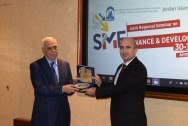
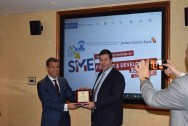
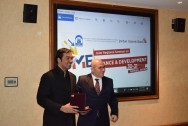
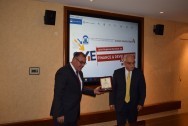
.jpg?id=4_638)
